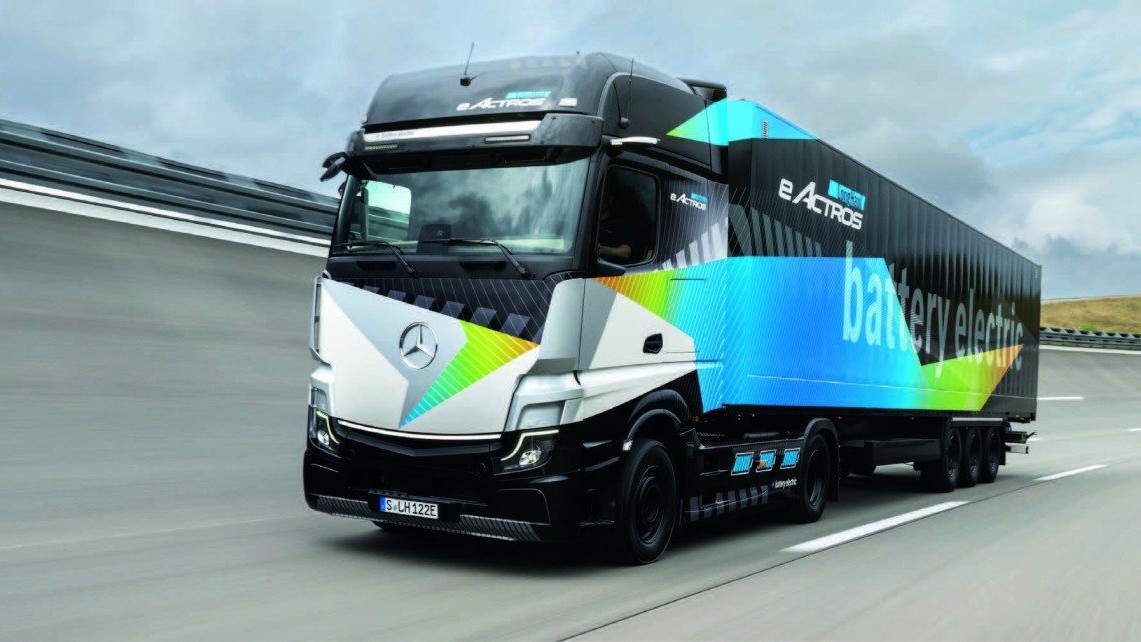DAF XD and eActros Long Haul are ITOY winners

DAF’s XD series has received the International Truck of the Year 2023 honours, awarded by a jury of 24 commercial vehicle editors and senior journalists representing 24 of Europe’s major trucking magazines.
With a winning score of 134 votes, DAF’s new distribution truck fought off tough challenges from Scania’s new Super long-haul driveline range and Mercedes-Benz’s heavy-duty Actros, equipped with the third-generation OM471 engine.
The annual award goes to the truck introduced into the market in the previous 12 months, making the most significant contribution to road transport efficiency. This judgement relies on several critical criteria, including technological innovation, comfort, safety, driveability, fuel economy, environmental ‘footprint,’ and total cost of ownership (TCO).
With the same DNA as the new generation heavy-duty XF, XG, and XG+ models, DAF’s XD has taken full advantage of the EU’s new mass and dimension regulations.
The result is a truck range that dramatically improves direct visibility (a key factor for distribution vehicles), internal cab space, aerodynamics, fuel efficiency, active and passive safety, and driver comfort.
During recent test drives in the Netherlands, the IToY journalists appreciated the driving position and the all-round enhanced visibility provided by a large, curved windscreen, side windows with low beltlines and the kerb-view window. These features – along with the optional digital vision system that replaces the traditional rear-view mirrors and the corner view mirror – improve the safety of vulnerable road users along congested urban roads.
The IToY journalists also praised the performance of the new, highly efficient powertrain, based on the inline-six Paccar MX-11 engine, coupled with the ZF TraXon automated gearbox with advanced predictive features.
Summing up the jury vote, IToY Chairman Gianenrico Griffini commented: “With the introduction of the new XD series, DAF has delivered a state-of-the-art distribution truck family that sets a new benchmark in the automotive industry. Moreover, the new XD is a suitable platform for the coming generation of battery electric vehicles (BEVs), to be introduced at the IAA Transportation.”

Mercedes-Benz Trucks’ eActros LongHaul – a concept prototype for heavy-duty long-distance transport – has won the 2023 Truck Innovation Award.
This award acknowledges the enormous technological changes and energy transition within the automotive sector and is awarded by a jury of 25 commercial vehicle editors and senior journalists representing major trucking magazines from Europe and South Africa.
With a winning score of 112 votes, Mercedes-Benz Trucks’ battery-electric truck (BEV) fought off the competition from ZF eTrailer, the full-electric Volta Trucks Zero range, and Faun Enginius fuel-cell powered vehicles for municipal missions.
The IToY journalists praised the advanced characteristics of the eActros LongHaul, which employs fast-charging long-service life lithium-iron phosphate cell technology (LFP), and the speed of Mercedes-Benz Trucks’ R&D process. Announced for the first time in 2020, the eActros LongHaul is already undergoing intensive testing, will hit public roads this year, and near-production prototypes will go to customers for real-world-use testing in 2023.
The IToY journalists also appreciated the compact dimensions of the tractor unit, which, within a wheelbase of four meters, accommodates three battery packs with a total installed capacity of more than 600kWh and two electric motors, as part of a new e-axle, with a continuous output of 400kW.
IToY chairman Gianenrico Griffini says: “The Mercedes-Benz eActros LongHaul opens a new chapter towards e-mobility. It’s proof that the transition to CO2-neutral long-haul transport is an achievable target, relying on hi-tech solutions and continuous R&D efforts.”
A Truck Innovation Award nominee must be an advanced technology vehicle with a gross vehicle weight of more than 3.5-tonnes fitted with an alternative driveline or fuel system. Otherwise, it must feature specific high-tech solutions concerning connectivity (semi- or fully autonomous driving systems), platooning capability, or advanced support services such as remote diagnostics.





